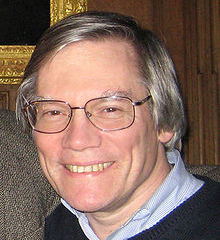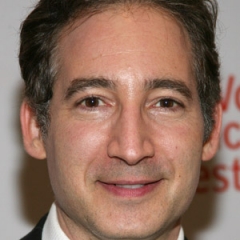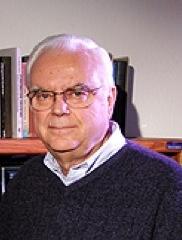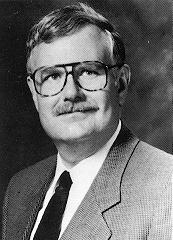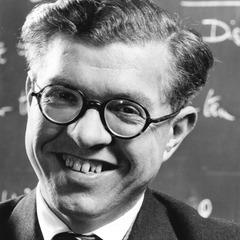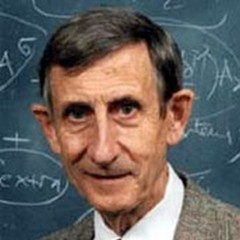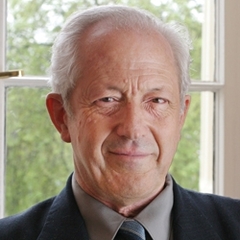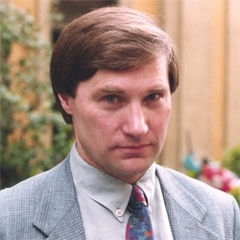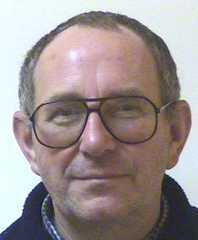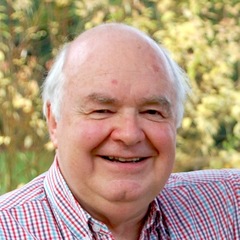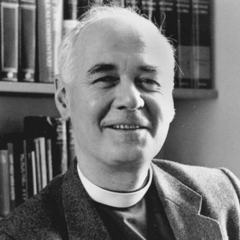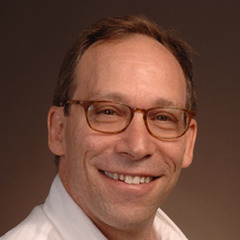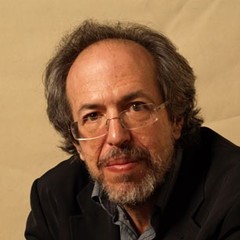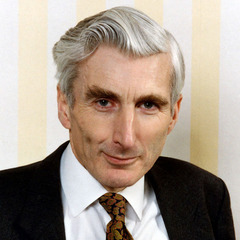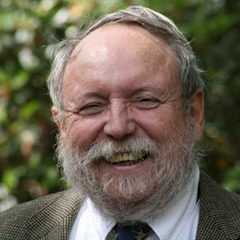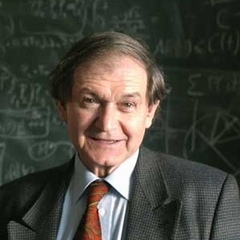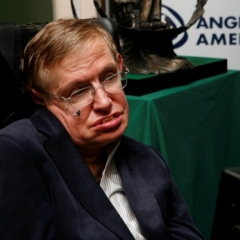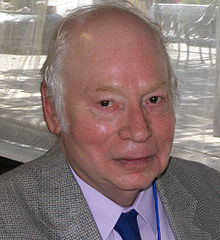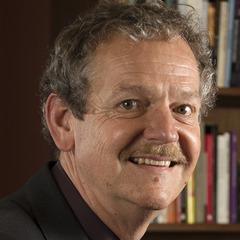Paul Davies quotes
-
“The thing about lucid dreams is that it's not like the real world where you are constrained by all sorts of things, including the laws of physics-you can do magic.”
-- Paul DaviesSource : "Dreams - the lucid experience". "All in the Mind" with Lynne Malcolm, www.abc.net.au. November 2, 2014.

-
“I suppose my interest in looking for life elsewhere in the universe really dates back to my teens. What teenager doesn't look up at the sky at night and think am I alone in the universe? Well most people get over it, but I never did and though I made a career more in physics and cosmology than astrobiology I've always had a soft spot for the subject of life because it does seem so mysterious.”
-- Paul Davies -
“There is for me powerful evidence that there is something going on behind it all. . . It seems as though somebody has fine tuned nature's numbers to make the Universe. . . The impression of design is overwhelming.”
-- Paul Davies -
“It's worth remembering that all technology leaves a footprint. For example, our own technology is leaving a footprint in terms of global warming, which could be detected from a long way away. One assumes that a very advanced civilization that has been around maybe millions and millions of years would have an even bigger footprint that might extend beyond its planet to its immediate astronomical environment.”
-- Paul Davies -
-
“People take it for granted that the physical world is both ordered and intelligible. The underlying order in nature - the laws of physics - are simply accepted as given, as brute facts. Nobody asks where they came from; at least not in polite company. However, even the most atheistic scientist accepts as an act of faith that the universe is not absurd, that there is a rational basis to physical existence manifested as law-like order in nature that is at least partly comprehensible to us. So science can proceed only if the scientist adopts an essentially theological worldview.”
-- Paul Davies -
“If we knew we were not alone in the universe it would have a very, very deep impact on our worldview, on our understanding of our place in the universe.”
-- Paul Davies -
“In time, [a Martian] colony would grow to the point of being self- sustaining. When this stage was reached, humanity would have a precious insurance policy against catastrophe at home. During the next millennium there is a significant chance that civilization on Earth will be destroyed by an asteroid, a killer plague or a global war. A Martian colony could keep the flame of civilization and culture alive until Earth could be reverse-colonized from Mars.”
-- Paul Davies -
“Supposing we knew that up there is some alien civilization and it's sending radio signals our way we should not tell the public where that is. We could say that we've picked up a signal, but we should not tell them where for the simple reason that anybody could commandeer a radio telescope, set themselves up as some self appointed spokesperson of mankind and start beaming all sorts of crazy messages back to the aliens.”
-- Paul Davies -
-
“Should we find a second form of life right here on our doorstep, we could be confident that life is a truly cosmic phenomenon. If so, there may well be sentient beings somewhere in the galaxy wondering, as do we, if they are not alone in the universe.”
-- Paul Davies -
“I think if we're going to send messages to the stars then it needs a great deal of thought that it's something that should involve the entire not only scientific community, but the entire world community. We need to think very carefully indeed.”
-- Paul Davies -
“Mathematics is universal. It's discovered by human beings, but the rules of mathematics are the same throughout the universe and the laws of the universe.”
-- Paul Davies -
“We could tell them [alien civilization] things that we have discovered in the realm of mathematical physics, but there is stuff that I would like to know. There are some famous problems like how to bring gravitation and quantum physics together, the long-sought-after theory of quantum gravity. But it may be hard to understand the answer that comes back.”
-- Paul Davies -
-
“It's always good in science to say "Well how do you know that?" and "Are you really sure?" and "Could there be an exceptional case?"”
-- Paul Davies -
“You've got to get away from the idea cancer is a disease to be cured. It's not a disease really. The cancer cell is your own body, your own cells, just misbehaving and going a bit wrong, and you don't have to cure cancer. You don't have to get rid of all those cells. Most people have cancer cells swirling around inside them all the time and mostly they don't do any harm, so what we want to do is prevent the cancer from gaining control. We just want to keep it in check for long enough that people die of something else.”
-- Paul Davies -
“Cancer is like another form of life. It's closely related to healthy life. A healthy body is one form of life. Cancer is in a way nature's experiment with life.”
-- Paul Davies -
“Studying cancer could provide huge insights for astrobiologists into the nature of life itself.”
-- Paul Davies -
-
“If we're thinking about old civilizations, those that formed a long time ago and there were stars and planets around long before Earth even existed, then these are going to be towards the center of the galaxy. That is the place to look if you think there are ancient civilizations that have made beacons or some other way of attracting our attention.”
-- Paul Davies -
“The problem here is that a civilization that is 1,000 light years away doesn't know we exist. They don't know that we have radio telescopes here on Earth because they see Earth as it was 1,000 years ago. Nothing can travel faster than light, so however good their instruments they can't see in affect the future. So there is no particular reason they should be sending us messages at this time.”
-- Paul Davies -
“To a physicist life looks nothing short of a miracle. It's just amazing what living things can do.”
-- Paul DaviesSource : "Big Think Interview With Paul Davies". Interview with Austin Allen, bigthink.com. April 15, 2010.

-
“In the 1990s I began to study the prospects that life could spread from Mars to Earth or maybe Earth to Mars and that maybe life began on Mars and came to Earth, and that idea seemed to have a lot of traction and is now accepted as very plausible.”
-- Paul Davies -
-
“"Are we alone in the universe?" This is a question which goes back to the dawn of history, but for most of human history it has been in the province of religion and philosophy. Fifty or something years ago, however, it became part of science.”
-- Paul Davies -
“If we're looking for intelligence in the universe I think everybody assumes that this has to start with life and so the question is: "How likely is it that there will be life elsewhere in the universe?"”
-- Paul Davies -
“When I was a student almost nobody thought there was any life beyond Earth. Today it's fashionable to say that there is life all over the place, that the universe is teeming with it, but the scientific facts on the ground haven't really changed.”
-- Paul Davies -
“It's only fashion that has said the pendulum has swung from extreme skepticism about extraterrestrial life to extreme credulity. The truth is somewhere in between.”
-- Paul Davies -
-
“I should say we know that there are many, many other Earths out there. We're almost certain that there will be upwards of a billion Earth-like planets in our galaxy alone, so there is no lack of real estate where life might happen, but what we don't know is how likely it is given the real estate, given a wonderful pristine planet like Earth how likely is it that life will pop up inhabited? We don't know the answer to that.”
-- Paul Davies -
“What we want is another sample of life, which is not on our tree of life at all. All life that we've studied so far on Earth belongs to the same tree. We share genes with mushrooms and oak trees and fish and bacteria that live in volcanic vents and so on that it's all the same life descended from a common origin. What we want is a second tree of life. We want alien life, alien not necessarily in the sense of having come from space, but alien in the sense of belonging to a different tree altogether. That is what we're looking for, "life 2.0."”
-- Paul Davies -
“Most life on Earth is microbes. we've only just scratched the surface of the microbial realm. Probably less than .1% of microbes have been classified let alone cultured or had their genes sequenced, so really that microbial realm is a mystery.”
-- Paul Davies -
“We know that within the solar system is very unlikely there will be anything more advanced than microbial life, but if we think outside the solar system and then, the distances are, of course, immense, then there could be Earth-like planets with more advanced form of life.”
-- Paul Davies -
-
“Cancer is not something confined to human beings. It's found in all multi cellular organisms where the adult cells proliferate, so it's widespread in the biosphere. It's a phenomenon that is deeply related to the history of life itself, so by studying cancer I think we can illuminate the history of life itself and vice versa.”
-- Paul Davies -
“It will be in the convergence of evolutionary biology, developmental biology and cancer biology that the answer to cancer will lie. Nor will this confluence be a one-way street.”
-- Paul Davies -
“It is possible that a scientific discovery will be made that humans will later regret because it has awful consequences. The problem is, we probably would not know in advance and, once the discovery is made, it cannot be undiscovered.”
-- Paul Davies -
“Man-made computers are limited in their performance by finite processing speed and memory. So, too, the cosmic computer is limited in power by its age and the finite speed of light.”
-- Paul Davies -
-
“Most research into life's murky origin has been carried out by chemists. They've tried a variety of approaches in their attempts to recreate the first steps on the road to life, but little progress has been made. Perhaps that is no surprise, given life's stupendous complexity.”
-- Paul Davies -
“In the frantic search for an elusive 'cure,' few researchers stand back and ask a very basic question: why does cancer exist? What is its place in the grand story of life?”
-- Paul Davies -
“If we do discover more than one type of life on Earth, we can be fairly certain that the universe is teeming with it, for it would be inconceivable that life started twice here but never on all the other earth-like planets.”
-- Paul Davies -
“For me, science is already fantastical enough. Unlocking the secrets of nature with fundamental physics or cosmology or astrobiology leads you into a wonderland compared with which beliefs in things like alien abductions pale into insignificance.”
-- Paul Davies -
-
“Cosmologists have attempted to account for the day-to-day laws you find in textbooks in terms of fundamental 'superlaws,' but the superlaws themselves must still be accepted as brute facts. So maybe the ultimate laws of nature will always be off-limits to science.”
-- Paul Davies -
“Clearly, some creative thinking is badly needed if humans are to have a future beyond Earth. Returning to the Moon may be worthy and attainable, but it fails to capture the public's imagination. What does get people excited is the prospect of a mission to Mars.”
-- Paul Davies -
“Cancer touches every family in one way or another. As other diseases are brought under control, cancer is set to become the number one killer, and is already in epidemic proportions worldwide.”
-- Paul Davies -
“An argument often given for why Earth couldn't host another form of life is that once the life we know became established, it would have eliminated any competition through natural selection. But if another form of life were confined to its own niche, there would be little direct competition with regular life.”
-- Paul Davies -
-
“A permanent base on Mars would have a number of advantages beyond being a bonanza for planetary science and geology. If, as some evidence suggests, exotic micro-organisms have arisen independently of terrestrial life, studying them could revolutionise biology, medicine and biotechnology.”
-- Paul Davies -
“To expect alien technology to be just a few decades ahead of ours is too incredible to be taken seriously.”
-- Paul Davies -
“In science, a healthy skepticism is a professional necessity, whereas in religion, having belief without evidence is regarded as a virtue.”
-- Paul DaviesSource : "Taking Science on Faith" by Paul Davies, www.nytimes.com. November 24, 2007.

-
“Although the elusive 'cure' may be a distant dream, understanding the true nature of cancer will enable it to be better controlled and less menacing.”
-- Paul Davies -
-
“In spite of the fact that religion looks backward to revealed truth while science looks forward to new vistas and discoveries, both activities produce a sense of awe and a curious mixture of humility and arrogance in their practitioners. All great scientists are inspired by the subtlety and beauty of the natural world that they are seeking to understand. Each new subatomic particle, every unexpected object, produces delight and wonderment. In constructing their theories, physicists are frequently guided by arcane concepts of elegance in the belief that the universe is intrinsically beautiful.”
-- Paul Davies -
“My feeling is that scientific method has the power to account for and interlink all phenomena in the universe, including its origin, using the laws of nature. But that still leaves the laws unexplained.”
-- Paul Davies -
“In 1911 the little town of Nakhla in Egypt was the scene of one of the most remarkable events in historym when a chunk of rock fell from the sky and killed a dog. This is the only known canine fatality caused by a cosmic object. Improbably though this encounter was already, its truly extraordinary nature was revealed only decades later when scientists found that the culprit was not a common-or-garden meteorite, but a piece of the planet Mars.”
-- Paul Davies -
“Mathematics is not something that you find lying around in your back yard. It's produced by the human mind. Yet if we ask where mathematics works best, it is in areas like particle physics and astrophysics, areas of fundamental science that are very, very far removed from everyday affairs.”
-- Paul Davies -
-
“The Goldilocks Enigma is the idea that everything in the universe is just right for life, like the porridge in the fairy tale.”
-- Paul Davies -
“The question not many ask is: why are the laws of physics like they are?”
-- Paul Davies -
“The anthropic principle is an unfortunate name as it implies something about humanity.”
-- Paul Davies -
“When I was a student, the laws of physics were regarded as completely off limits. The job of the scientist, we were told, is to discover the laws and apply them, not inquire into their provenance.”
-- Paul Davies -
-
“We will never fully explain the world by appealing to something outside it that must simply be accepted on faith, be it an unexplained God or an unexplained set of mathematical laws.”
-- Paul Davies -
“Traditionally, scientists have treated the laws of physics as simply 'given,' elegant mathematical relationships that were somehow imprinted on the universe at its birth, and fixed thereafter. Inquiry into the origin and nature of the laws was not regarded as a proper part of science.”
-- Paul DaviesSource : "Yes, the universe looks like a fix. But that doesn't mean that a god fixed it" by Paul Davies, www.theguardian.com. June 25, 2007.

-
“Things changed with the discovery of neutron stars and black holes - objects with gravitational fields so intense that dramatic space and time-warping effects occur.”
-- Paul Davies -
“The vast majority of terrestrial species are in fact microbes, and scientists have only begun scratching the surface of the microbial realm. It is entirely possible that examples of life as we don't know it have so far been overlooked.”
-- Paul Davies -
-
“The language of chemistry simply does not mesh with that of biology. Chemistry is about substances and how they react, whereas biology appeals to concepts such as information and organisation. Informational narratives permeate biology.”
-- Paul Davies -
“So how can we test the idea that the transition from nonlife to life is simple enough to happen repeatedly? The most obvious and straightforward way is to search for a second form of life on Earth. No planet is more Earth-like than Earth itself, so if the path to life is easy, then life should have started up many times over right here.”
-- Paul Davies -
“Searching for alternative life on Earth might seem misconceived, because there is excellent evidence that every kind of life so far studied evolved from a common ancestor that lived billions of years ago. Yet most of the life that exists on Earth has never been properly classified.”
-- Paul Davies -
“Scientists have no agreed theory of the origin of life - plenty of scenarios, conjectures and just-so stories, but nothing with solid experimental support.”
-- Paul DaviesSource : "Life, but not as we know it" by Paul Davies, www.theguardian.com. March 14, 2010.

-
-
“Scientists are slowly waking up to an inconvenient truth - the universe looks suspiciously like a fix. The issue concerns the very laws of nature themselves.”
-- Paul DaviesSource : "Yes, the universe looks like a fix. But that doesn't mean that a god fixed it" by Paul Davies, www.theguardian.com. June 25, 2007.

-
“No planet is more earth-like than Earth itself, so if life really does pop up readily in earth-like conditions, then surely it should have arisen many times right here on our home planet? And how do we know it didn't? The truth is, nobody has looked.”
-- Paul Davies -
“The secret of our success on planet Earth is space. Lots of it. Our solar system is a tiny island of activity in an ocean of emptiness.”
-- Paul Davies -
“Although gravity is by far the weakest force of nature, its insidious and cumulative action serves to determine the ultimate fate not only of individual astronomical objects but of the entire cosmos. The same remorseless attraction that crushes a star operates on a much grander scale on the universe as a whole.”
-- Paul Davies -
-
“Perhaps the best motivation for going to Mars is political. It is obvious that no single nation currently has either the will or the resources to do it alone, but a consortium of nations and space agencies could achieve it within 20 years.”
-- Paul Davies -
“The way life manages information involves a logical structure that differs fundamentally from mere complex chemistry. Therefore chemistry alone will not explain life's origin, any more than a study of silicon, copper and plastic will explain how a computer can execute a program.”
-- Paul DaviesSource : "The secret of life won't be cooked up in a chemistry lab" by Paul Davies, www.theguardian.com. January 13, 2013.

-
“Technology is, in the broadest sense, mind or intelligence or purpose blending with nature.”
-- Paul DaviesSource : Paul Davies (2010). “The Eerie Silence: Renewing Our Search for Alien Intelligence”, p.145, Houghton Mifflin Harcourt
-
“We might expect intelligent life and technological communities to have emerged in the universe billions of years ago. Given that human society is only a few thousand years old, and that human technological society is mere centuries old, the nature of a community with millions or even billions of years of technological and social progress cannot even be imagined. ... What would we make of a billion-year-old technological community?”
-- Paul Davies -
-
“The burgeoning field of computer science has shifted our view of the physical world from that of a collection of interacting material particles to one of a seething network of information. In this way of looking at nature, the laws of physics are a form of software, or algorithm, while the material world-the hardware-plays the role of a gigantic computer.”
-- Paul Davies -
“Until now, physical theories have been regarded as merely models with approximately describe the reality of nature. As the models improve, so the fit between theory and reality gets closer. Some physicists are now claiming that supergravity is the reality, that the model and the real world are in mathematically perfect accord.”
-- Paul Davies -
“Wheeler hopes that we can discover, within the context of physics, a principle that will enable the universe to come into existence "of its own accord." In his search for such a theory, he remarks: "No guiding principle would seem more powerful than the requirement that it should provide the universe with a way to come into being." Wheeler likened this 'self-causing' universe to a self-excited circuit in electronics.”
-- Paul Davies -
“It is hard to resist the impression that the present structure of the universe, apparently so sensitive to minor alterations in numbers, has been rather carefully thought out...The seemingly miraculous concurrence of these numerical values must remain the most compelling evidence for cosmic design.”
-- Paul Davies -
-
“It may seem bizarre, but in my opinion science offers a surer path to God than religion.”
-- Paul DaviesSource : Paul Davies (1984). “God and the New Physics”, p.9, Simon and Schuster
-
“Even if we don't have a precise idea of exactly what took place at the beginning, we can at least see that the origin of the universe from nothing need not be unlawful or unnatural or unscientific.”
-- Paul Davies -
“Imagine a civilisation that's way in advance of us wants to communicate with us, and assist us in our development. The information we provide to them must reflect our highest aspirations and ideals, and not just be some crazy person's bizarre politics or religion.”
-- Paul Davies -
“Astonishingly, in spite of decades of research, there is no agreed theory of cancer, no explanation for why, inside almost all healthy cells, there lurks a highly efficient cancer subroutine that can be activated by a variety of agents - radiation, chemicals, inflammation and infection.”
-- Paul Davies -
-
“Cancer is such a ruthless adversary because it behaves as if it has its own fiendishly cunning agenda.”
-- Paul Davies -
“Science, we are repeatedly told, is the most reliable form of knowledge about the world because it is based on testable hypotheses. Religion, by contrast, is based on faith. The term 'doubting Thomas' well illustrates the difference.”
-- Paul Davies -
“The birth of science as we know it arguably began with Isaac Newton's formulation of the laws of gravitation and motion. It is no exaggeration to say that physics was reborn in the early 20th-century with the twin revolutions of quantum mechanics and the theory of relativity.”
-- Paul Davies -
“No attempt to explain the world, either scientifically or theologically, can be considered successful until it accounts for the paradoxical conjunction of the temporal and the atemporal, of being and becoming. And no subject conforms this paradoical conjuction more starkly than the origin of the universe.”
-- Paul Davies -
-
“Many investigators feel uneasy stating in public that the origin of life is a mystery, even though behind closed doors they admit they are baffled.”
-- Paul Davies -
“Science can proceed only if the scientist adopts an essentially theological worldview. ..even the most atheistic scientist accepts as an act of faith the existence of a law-like order in nature that is at least in part comprehensible to us.”
-- Paul Davies -
“Many billions of years will elapse before the smallest, youngest stars complete their nuclear burning and shrink into white dwarfs. But with slow, agonizing finality perpetual night will surely fall.”
-- Paul Davies -
“Very, very slowly, the dwarf remnants of what was once our mighty sun will cool and dim, until it embarks on its final metamorphosis, gradually solidifying into a crystal of extraordinary rigidity. Eventually it will fade out completely, merging quietly into the blackness of space.”
-- Paul Davies -
-
“Astronauts have been stuck in low-Earth orbit, boldly going nowhere. American attempts to kick-start a new phase of lunar exploration have stalled amid the realisation that NASA's budget is too small for the job.”
-- Paul Davies -
“Is there anything science should not try to explain? Science is knowledge and knowledge is power - power to do good or evil. Sometimes ignorance is bliss.”
-- Paul Davies -
“General relativity is the cornerstone of cosmology and astrophysics. It has also provided the conceptual basis for string theory and other attempts to unify all the forces of nature in terms of geometrical structures.”
-- Paul Davies -
“The secret of life does not lie in its chemical basis . . . Life succeeds precisely because it evades chemical imperatives.”
-- Paul Davies -
-
“The temptation to believe that the Universe is the product of some sort of design, a manifestation of subtle aesthetic and mathematical judgment, is overwhelming. The belief that there is "something behind it all" is one that I personally share with, I suspect, a majority of physicists.”
-- Paul Davies -
“The origin of life is one of the great outstanding mysteries of science.”
-- Paul Davies -
“The laws of physics ... seem to be the product of exceedingly ingenious design... The universe must have a purpose.”
-- Paul Davies -
“If you get a drill and drill down 5km beneath the ground, it's teeming with life - millions of tiny living fossils. They resemble the earliest life forms and suggest that life started under the Ground. The bible talks of Eden as a sunny parkland with white fluffy clouds, but it probably ascended from the region that we now associate with Hell.”
-- Paul Davies -
-
“I always look on the black side of life. That way, you won't be disappointed and I'm cheerful if it doesn't work out. I'm a cheerful pessimist.”
-- Paul Davies -
“Science is about explaining the world, and religion is about interpreting it. There shouldn't be any conflict.”
-- Paul Davies -
“The universe contains vastly more order than Earth-life could ever demand. All those distant galaxies, irrelevant for our existence, seem as equally well ordered as our own.”
-- Paul Davies -
“The Eerie Silence: are we alone in the universe?”
-- Paul Davies -
-
“Science may explain the world, but we still have to explain science. The laws which enable the universe to come into being spontaneously seem themselves to be the product of exceedingly ingenious design. If physics is the product of design, the universe must have a purpose, and the evidence of modern physics suggests strongly to me that the purpose includes us”
-- Paul DaviesSource : Paul Davies (1985). “Superforce”, p.243, Simon and Schuster
-
“Cancer cells come pre-programmed to execute a well-defined cascade of changes, seemingly designed to facilitate both their enhanced survival and their dissemination through the bloodstream. There is even an air of conspiracy in the way that tumours use chemical signals to create cancer-friendly niches in remote organs.”
-- Paul Davies
You may also like:
-
Alan Guth
Physicist -
Brian Greene
Theoretical Physicist -
Frank Drake
Astronomer -
Frank J. Tipler
Physicist -
Fred Hoyle
Astronomer -
Freeman Dyson
Physicist -
George F. R. Ellis
Professor -
John D. Barrow
Physicist -
John Gribbin
Science writer -
John Lennox
Mathematician -
John Polkinghorne
Physicist -
Lawrence M. Krauss
Physicist -
Lee Smolin
Physicist -
Martin Rees
Astronomer -
Michael Ruse
Philosopher -
Roger Penrose
Physicist -
Seth Shostak
Astronomer -
Stephen Hawking
Physicist -
Steven Weinberg
Theoretical Physicist -
Philip Clayton
theologian
